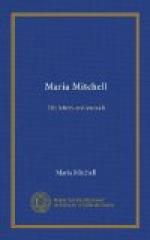“Professor Chauvenet enumerates among ‘accidental errors in observing,’ those arising from imperfections in the senses, as ’the imperfection of the eye in measuring small spaces; of the ear, in estimating small intervals of time; of the touch, in the delicate handling of an instrument.’
“A girl’s eye is trained from early childhood to be keen. The first stitches of the sewing-work of a little child are about as good as those of the mature man. The taking of small stitches, involving minute and equable measurements of space, is a part of every girl’s training; she becomes skilled, before she is aware of it, in one of the nicest peculiarities of astronomical observation.
“The ear of a child is less trained, except in the case of a musical education; but the touch is a delicate sense given in exquisite degree to a girl, and her training comes in to its aid. She threads a needle almost as soon as she speaks; she touches threads as delicate as the spider-web of a micrometer.
“Then comes in the girl’s habit of patient and quiet work, peculiarly fitted to routine observations. The girl who can stitch from morning to night would find two or three hours in the observatory a relief.”
CHAPTER XII
RELIGIOUS BELIEFS—COMMENTS ON SERMONS—CONCORD SCHOOL—WHITTIER—COOKING SCHOOLS—ANECDOTES
Partly in consequence of her Quaker training, and partly from her own indifference towards creeds and sects, Miss Mitchell was entirely ignorant of the peculiar phrases and customs used by rigid sectarians; so that she was apt to open her eyes in astonishment at some of the remarks and sectarian prejudices which she met after her settlement at Vassar College. She was a good learner, however, and after a while knew how to receive in silence that which she did not understand.
“Miss Mitchell,” asked one good missionary, “what is your favorite position in prayer?” “Flat upon my back!” the answer came, swift as lightning.
In 1854 she wrote in her diary:
“There is a God, and he is good, I say to myself. I try to increase my trust in this, my only article of creed.”
Miss Mitchell never joined any church, but for years before she left Nantucket she attended the Unitarian church, and her sympathies, as long as she lived, were with that denomination, especially with the more liberally inclined portion. There were always a few of the teachers and’ some of the students who sympathized with her in her views; but she usually attended the college services on Sunday.
President Taylor, of Vassar College, in his remarks at her funeral, stated that all her life Professor Mitchell had been seeking the truth,—that she was not willing to accept any statement without studying into the matter herself,—“And,” he added, “I think she has found the truth she was seeking.”
Miss Mitchell never obtruded her views upon others, nor did she oppose their views. She bore in silence what she could not believe, but always insisted upon the right of private judgment.




